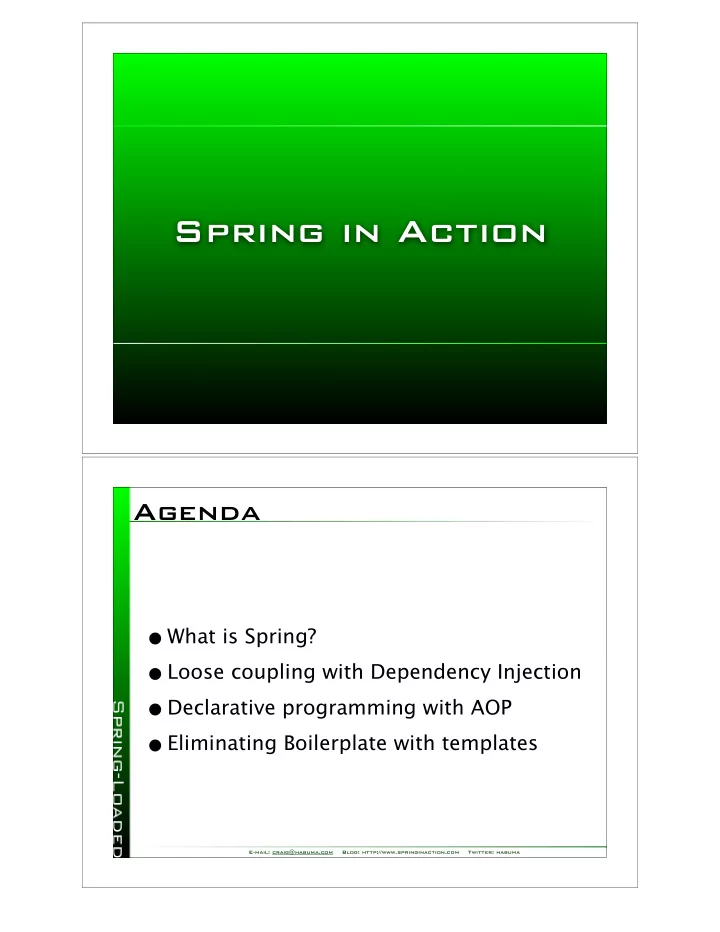

Spring in Action Agenda • What is Spring? • Loose coupling with Dependency Injection • Declarative programming with AOP • Eliminating Boilerplate with templates E-mail: craig@habuma.com Blog: http://www.springinaction.com Twitter: habuma
What is Spring? What is Spring? • Lightweight container framework • Lightweight - minimally invasive • Container - manages app component lifecycle • Framework - basis for enterprise Java apps • Open source • Apache licensed E-mail: craig@habuma.com Blog: http://www.springinaction.com Twitter: habuma
What it’s not • An application server • Although...there’s tcServer, dmServer • And Spring supports a lot of the EJB3 model E-mail: craig@habuma.com Blog: http://www.springinaction.com Twitter: habuma The “Spring Way” • Spring’s overall theme: Simplifying Enterprise Java Development • Strategies • Loose coupling with dependency injection • Declarative programming with AOP • Boilerplate reduction with templates • Minimally invasive and POJO-oriented E-mail: craig@habuma.com Blog: http://www.springinaction.com Twitter: habuma
A brief history of Spring • Spring 1.0 • DI, AOP, web framework • Spring 2.0 • Extensible config, bean scoping, dynamic language support, new tag library • Spring 2.5 • Annotation-driven, automatic bean discovery, new web framework, JUnit 4 integration • Spring 3.0 • REST, SpEL, declarative validation, ETag support, Java-based configuration E-mail: craig@habuma.com Blog: http://www.springinaction.com Twitter: habuma Beyond the framework • Spring Web Flow • Spring Batch • BlazeDS Integration • Spring Integration • Spring-WS • Spring LDAP • Spring Security • Spring IDE / STS • Spring-DM • Spring Rich Client • dmServer • Spring .NET • Bundlor • Spring BeanDoc • tcServer • Groovy/Grails E-mail: craig@habuma.com Blog: http://www.springinaction.com Twitter: habuma
Spring community • Forum: http://forum.springframework.org • Issues: http://jira.springframework.org • Extensions: • http://www.springframework.org/extensions • Conferences, user groups, etc • GET INVOLVED! E-mail: craig@habuma.com Blog: http://www.springinaction.com Twitter: habuma Loose Coupling with Dependency Injection
What’s wrong here? public class Mechanic { public void fixCar() { PhillipsScrewdriver tool = new PhillipsScrewdriver(); tool.use(); } } E-mail: craig@habuma.com Blog: http://www.springinaction.com Twitter: habuma How about now? public class Mechanic { public void fixCar() { Tool tool = new PhillipsScrewdriver(); tool.use(); } } E-mail: craig@habuma.com Blog: http://www.springinaction.com Twitter: habuma
Any better? public class Mechanic { public void fixCar() { ToolFactory tf = ToolFactory.getInstance(); Tool tool = tf.getTool(); tool.use(); } } E-mail: craig@habuma.com Blog: http://www.springinaction.com Twitter: habuma Certainly this is better... public class Mechanic { public void fixCar() { InitialContext ctx = null; try { ctx = new InitialContext(); Tool quest = (Tool) ctx.lookup( "java:comp/env/Tool"); tool.use(); } catch (NamingException e) { } finally { if(ctx != null) { try {ctx.close(); } catch (Exception e) {} } } } } E-mail: craig@habuma.com Blog: http://www.springinaction.com Twitter: habuma
Let’s try again... public class Mechanic { private Tool tool; public Mechanic(Tool tool) { this.tool = tool; } public void fixCar() { tool.use(); } } E-mail: craig@habuma.com Blog: http://www.springinaction.com Twitter: habuma Or maybe this... public class Mechanic { private Tool tool; public void setTool(Tool tool) { this.tool = tool; } public void fixCar() { tool.use(); } } E-mail: craig@habuma.com Blog: http://www.springinaction.com Twitter: habuma
Dependency injection • Objects are given what they need • Coupling is low when used with interfaces • Makes classes easier to swap out • Makes classes easier to unit test E-mail: craig@habuma.com Blog: http://www.springinaction.com Twitter: habuma DI in Spring • Several options • XML • Annotation-driven • Java-based configuration • None are mutually exclusive E-mail: craig@habuma.com Blog: http://www.springinaction.com Twitter: habuma
XML-based wiring <bean id="screwdriver" class="com.habuma.tools.PhillipsScrewdriver" /> <bean id="mechanic" class="com.habuma.mechanic.AutoMechanic"> <constructor-arg ref="screwdriver" /> </bean> <bean id="screwdriver" class="com.habuma.tools.PhillipsScrewdriver" /> <bean id="mechanic" class="com.habuma.mechanic.AutoMechanic"> <property name="tool" ref="screwdriver" /> </bean> E-mail: craig@habuma.com Blog: http://www.springinaction.com Twitter: habuma Annotation-based wiring <context:component-scan base-package="com.habuma.mechanic" /> public class Mechanic { private Tool tool; public class Mechanic { @Autowired @Autowired public void setTool(Tool tool) { private Tool tool; this.tool = tool; } public void fixCar() { tool.use(); public void fixCar() { } tool.use(); } } E-mail: craig@habuma.com Blog: http://www.springinaction.com Twitter: habuma
Java-based configuration @Configuration public class AutoShopConfig { @Bean public Tool screwdriver() { return new PhillipsScrewdriver(); } @Bean public Mechanic mechanic() { return new AutoMechanic(screwdriver()); } } E-mail: craig@habuma.com Blog: http://www.springinaction.com Twitter: habuma Declarative Programming with AOP
Aspects • Separate loosely-related behavior • Objects don’t have to do work that isn’t their job • Keeps them cohesive • Keeps them simple E-mail: craig@habuma.com Blog: http://www.springinaction.com Twitter: habuma Life without AOP public void withdrawCash(double amount) { UserTransaction ut = context.getUserTransaction(); try { ut.begin(); updateChecking(amount); machineBalance -= amount; insertMachine(machineBalance); ut.commit(); } catch (ATMException ex) { LOGGER.error("Withdrawal failed"); try { ut.rollback(); } catch (SystemException syex) { // ... } } } E-mail: craig@habuma.com Blog: http://www.springinaction.com Twitter: habuma
Life with AOP public void withdrawCash(double amount) { try { updateChecking(amount); machineBalance -= amount; insertMachine(machineBalance); } catch (ATMException ex) { LOGGER.error("Withdrawal failed"); } } E-mail: craig@habuma.com Blog: http://www.springinaction.com Twitter: habuma With some more AOP public void withdrawCash(double amount) { updateChecking(amount); machineBalance -= amount; insertMachine(machineBalance); } E-mail: craig@habuma.com Blog: http://www.springinaction.com Twitter: habuma
Spring AOP • Comes in 3 forms • XML-based • Annotation-based • Native AspectJ E-mail: craig@habuma.com Blog: http://www.springinaction.com Twitter: habuma AOP Terms • Aspect • Advice • Pointcut • Joinpoint E-mail: craig@habuma.com Blog: http://www.springinaction.com Twitter: habuma
Logging aspect public class LoggingAspect { private static final Logger LOGGER = Logger.getLogger(LoggingAspect.class); public logBefore() { LOGGER.info("Starting withdrawal"); } public logAfterSuccess() { LOGGER.info("Withdrawal complete"); } public logFailure() { LOGGER.info("Withdrawal failed"); } } E-mail: craig@habuma.com Blog: http://www.springinaction.com Twitter: habuma XML-based AOP <bean id="loggingAspect" class="LoggingAspect" /> <aop:config> <aop:aspect ref="loggingAspect"> <aop:before pointcut="execution(* *.withdrawCash(..))" method="logBefore" /> <aop:after-returning pointcut="execution(* *.withdrawCash(..))" method="logBefore" /> <aop:after-throwing pointcut="execution(* *.withdrawCash(..))" method="logBefore" /> </aop:aspect> </aop:config> E-mail: craig@habuma.com Blog: http://www.springinaction.com Twitter: habuma
Annotation-based AOP @Aspect public class LoggingAspect { private static final Logger LOGGER = Logger.getLogger(LoggingAspect.class); @Pointcut("execution(* *.withdrawCash(..))") public void withdrawal() {} @Before("withdrawal()") public logBefore() { LOGGER.info("Starting withdrawal"); <aop:aspectj-autoproxy /> } @AfterReturning("withdrawal()") public logAfterSuccess() { LOGGER.info("Withdrawal complete"); } @AfterThrowing("withdrawal()") public logFailure() { LOGGER.info("Withdrawal failed"); } } E-mail: craig@habuma.com Blog: http://www.springinaction.com Twitter: habuma What about transactions? <tx:advice id="txAdvice"> <tx:attributes> <tx:method name="withdraw*" propagation="REQUIRED" /> <tx:method name="inquire*" propagation="SUPPORTS" read-only="true" /> </tx:attributes> </tx:advice> E-mail: craig@habuma.com Blog: http://www.springinaction.com Twitter: habuma
Recommend
More recommend